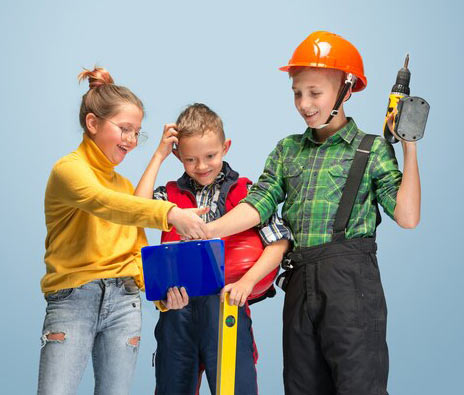Did you know that 12.7 million individuals needed a visit to the emergency room in 2022 for injuries brought on by consumer products? Alarmingly, the NSC reports that common items, often deemed safe, are frequently causing severe injuries, particularly to young children. Homeschooling presents a special chance to teach our kids important life lessons and domestic safety, which can help this situation.
As educators and parents, we want our children to grow up knowing their rights and responsibilities. They must also learn to ensure safety for themselves. Let us examine the importance of teaching these abilities and some efficient methods to achieve them.
The Value of Safety in the Home
Considering how frequently accidents occur at home, household safety is essential. In 2022, 53,500,000 people sustained nonfatal injuries at home, according to the NSC. Significantly lowering these risks can be achieved by teaching our kids safety precautions.
Fire Safety
Single- and two-family home fires in the US result in 54.3% of injuries and 59.1% of fatalities. Considering the data, fire safety is among the most crucial topics to focus on. Teaching children the principles of fire escape plans and the dangers of playing with matches or lighters is essential. Additionally, try teaching them how to use a fire extinguisher if they are old enough to understand it.
Electrical and Chemical Safety
Electrical safety is equally crucial. Adults must explain why it is unsafe for children to play with electrical outlets and appliances. They should demonstrate how to identify frayed wires so children can better understand the risks involved.
Nor should chemical safety be disregarded. Ask them to read warning labels on household cleaning products. Also, keep chemicals out of your kids’ reach because these products can be dangerous.
The kitchen is a hub for numerous hazards of various kinds. Many accidents can be avoided by teaching children about safe cooking techniques and how to use appliances properly. Teaching children to get photos and videos as proof if an appliance breaks down is also important.
For Gen Alpha kids who are familiar with smartphones, this should not be too tough. According to TorHoerman Law, relevant evidence about faulty products can later be helpful legally in developing product liability cases.
Building Legal Awareness Around Consumer Rights
Understanding consumer rights is crucial to being aware of the law. Children should also be involved in the content. This way, they can learn from an early age that laws exist to protect them from the products they purchase.
Businesses view your children as serious consumers, and you should, too. In 2022, 1.6 billion dollars will be spent on advertising various products specifically aimed at children.
A major shift has been evidenced toward digital platforms, aligning with young people’s media consumption habits. The trend is exemplified by platforms like YouTube, often called a “digital babysitter”. These young viewers are exposed to approximately $700 million worth of ads on YouTube alone.
Kids should be aware that goods must be safe to use and that they are legally shielded from faulty goods. Teach them about product recalls, which are notices that a product is dangerous and needs to be fixed or returned.
An Analysis of the Current Pressure Cooker Lawsuit Case
There have been pressure cooker explosion incidents recently that have resulted in serious injuries. These incidents demonstrate how crucial consumer rights and product safety are.
Electric pressure cookers from several brands have exploded due to malfunctions. Lawsuits against the manufacturers have been filed after injuries to people. These incidents serve as important reminders of the value of adhering to safety regulations and comprehending consumer rights.
How to Teach These Skills in a Homeschool Setting
Interactive lessons can be very successful. Lessons become relatable and interesting when real-world instances and articles, like the pressure cooker lawsuit talked about earlier, are used. Talking about these kinds of things enables kids to understand the practical applications of safety and legal knowledge.

- Practice safety drills: To help kids remember emergency procedures and reinforce safety lessons, regularly conduct drills for kitchen accidents and fire escape routes.
- Guest speakers: Invite experts, such as firefighters or legal professionals, to discuss safety and legal awareness, adding authoritative insights to the lessons.
- Educational resources: Use books, videos, and online content focused on household safety and legal rights. Safe Kids Worldwide and other websites provide useful resources and activities to aid in teaching.
Frequently Asked Questions
Use age-appropriate instruction and get started as soon as you can. As they grow and get more mobile, their sense of curiosity increases. Their capacity to understand more complex safety concepts also gets stronger. Educate toddlers on avoiding common hazardous sharp objects, hot surfaces, and items that can pose choking risks.
Make a fire escape plan and emphasize doable actions like stop, roll, and drop. Consider practical and positive activities like visiting a fire station to meet firefighters. This makes them less intimidating and more familiar as helpers in emergencies. Regularly discussing what to do in case of a fire, including making them learn about escape routes, can also help.
Explain that there are regulations in place to ensure everyone’s safety and simplify the ideas. Give relatable examples, such as seatbelt regulations or toy safety standards. Interactive methods like games, stories, and discussions that comprise role-playing can be also effective.
Yes, giving kids chores to do while keeping an eye on them helps them learn useful safety skills. When they are responsible for cleaning up spills or organizing their space, they become aware of safety practices. You can also try activities like using garden tools or handling kitchen appliances under supervision. In short, let’s prioritize awareness in our homes so that kids are prepared to face the world with confidence. Make safety a priority in households, ensuring your children are well prepared.






